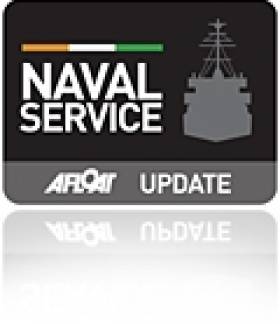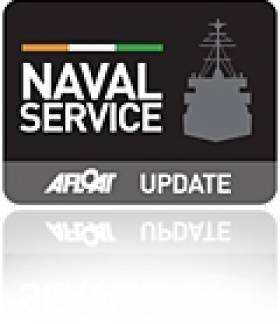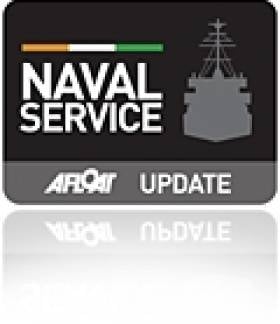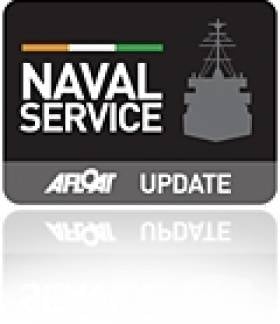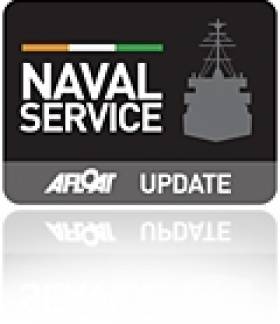Displaying items by tag: Commodore Mark Mellett
Leading Defence Forces Role for Naval Service Commodore
#NavalLEADER - Alan Shatter, Minster for Justice has promoted a Naval Service leader to the position of Defence Forces deputy chief of staff for the first time in the State's history.
Commodore Mark Mellett was confirmed in the new position by Cabinet today, the promotion is in recognition of the importance of the maritime economy and patrolling one of Europe's largest sea areas.
For more on this story Lorna Siggins of The Irish Times reports.
Dublin Bay Ceremonies for OPV L.E. Roisin
#COMMAND CHANGEOVER CEREMONY– The offshore patrol vessel OPV L.E. Róisín (P51) arrived to Dun Laoghaire Harbour today for the official reopening of the town's maritime museum and follows a changeover command ceremony held on board the vessel in Dublin Port last Friday, writes Jehan Ashmore.
At the ceremony the Lord Mayor of Dublin, Cllr Andrew Montague along with the Flag Officer Commanding the Naval Service, Commodore Mark Mellett presided over the command handover along Sir John Rogersons Quay.
This saw Lieutenant Commander Terry Ward, who is originally from Dublin, take over command from Lieutenant Commander Peter Twomey of the OPV which was adopted by the City of Dublin in 2000 and has maintained a strong connection with the capital.
The OPV departed on Sunday on a short patrol in the north Irish Sea until returning to Dublin Bay this morning. She berthed at the East Pier in Dun Laoghaire Harbour where at the nearby National Maritime Museum of Ireland, senior officer ratings and a party of 20 crew members made a guard of honour for President Michael D. Higgins who officially reopened the €4m renovated building.
The President is the supreme commander in chief of the Defence Forces and also is patron to the Maritime Institute of Ireland which was established in 1941 and runs the maritime museum in Dun Laoghaire.
Admiral Brown's Mayo Naval Connections
#ADMIRAL BROWN – In addition to the 155th anniversary commemoration of the death of Admiral William Brown which was held in the Argentinian capital at the weekend, as previously reported on Afloat.ie, a second ceremony was held in Foxford, Co. Mayo, the birthplace of the admiral who founded the navy of the South American country.
In attendance were the Argentine Ambassador, Dr. Maria Bondanza, with Argentine Naval Attache, Group Captain Alejandro Amoros, and Irish Naval Service Commodore, Mark Mellett. For more about this story as reported by MayoToday click HERE.
Commodore Mellett who also hails from Co. Mayo was appointed Flag Officer Commanding the Naval Service (FOCNS) following the retirement of Commodore Frank Lynch in December 2010.
The Mayo native will be addressing delegates this Friday at the inaugural IMERC Conference on Maritime Geostrategic Thinking for Ireland at the National Maritime College of Ireland (NMCI) in Ringaskiddy.
IMERC which stands for the Irish Maritime and Energy Resource Cluster will host the conference in the college where guided tours of the facility will also be made available during the one-day conference. The conference is open to the public and free of charge, for more information including conference agenda click HERE.
Homage Paid to Irish Founder of Argentinian Navy
#ADMIRAL BROWN- As Wexford is to host The John Barry Maritime Festival this summer, the father of the US Navy and commodore is held in the same league of Admiral William Brown, who founded the Argentinian Navy, who was remembered in a ceremony over the weekend in Buenos Aires, writes Jehan Ashmore.
The commemoration was to mark the 155th anniversary of William Brown's passing which took place at the Recoleta Cemetery, which was headed by Vice Admiral Carlos Alberto Paz, Chief of Staff of the Argentine Navy.
Among those attending were the Irish Ambassador, Mr. James McIntyre, the Chairman of the National Brownian Institute, Prof. Emilia Menotti, the President of the Naval Club, Vice Admiral Eduardo R. Llambi (Ret.) and City Council Officials.
The Navy General Directorate for Education marching band was also present, as well as Officer Cadets from the Admiral Brown Naval Lyceum (Reserve Officers' Academy). The Irish flag was carried alongside the host country by officers of the HQ Security Marine Bn.
For more about the event which included Santiago L. Aversa who represented the Irish branch of the Maritime Institute of Ireland (click HERE) and where its maritime museum in Dun Laoghaire is due to reopen early next month as previously reported on Afloat.ie
In 2006 the Naval Service 'flagship' L.É. Eithne (whose adopted homeport is Dun Laoghaire) under the command of Commodore Mark Mellett, made a historic first for the Naval Service when visiting Argentina and other South American ports.
In the same year two identical statues of the admiral were unveiled, one in Dublin's Docklands at Admiral Brown Way and Westport, Co. Mayo where the admiral hailed from.
Admiral Brown won victories against the Spanish and Brazilian fleets and as such he is regarded as a national hero, where in excess of 1,000 streets, 400 statues and venues such as stadiums (including football teams) schools, several towns, and a major city bears his name.
- naval service
- Argentinian Navy
- L.E. Eithne
- Commodore John Barry
- Admiral William Brown
- Commodore Mark Mellett
- M.I.I.
- Maritime Institute of Ireland
- Mariners Church Dun Laoghaire
- Maritime Museum Dun Laoghaire
- Dublin Docklands
- The John Barry Maritime Festival
- Admiral Brown Way
- Irish Ambassador McIntyre
- Westport Co Mayo
- Wexford Town
Navy Look to the Skies with Fuel-Saving Kite
#NAVAL SERVICE-The Naval Service are considering wind-power in an effort to reduce soaring fuel costs using "kite sails", reports the Examiner.
Commodore Mark Mellett confirmed the navy was collaborating with Irish Maritime and Energy Resource Cluster (IMERC), UCC, and CIT to develop "kite sails" which would be used to save fuel when a ship was carrying out surveillance.
"The kites would be used to reduce our energy bills, as we use 40% of the fuel allocated to the Defence Forces," said the commodore. "They could provide us with a speed of up to eight knots, which is as fast as a normal trawler."
The sails will have an added hi-tech edge (fitted with sensors to enhance the ships' radar capacity) which the service hopes to sell to other navies around the world. To read more about this story click HERE


























